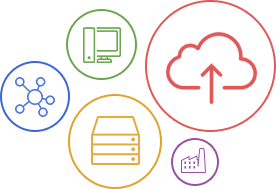At its simplest, a computer network is two or more devices that connect together in order to share information with one another. While most computer networks are composed of desktop and laptop computers linked by a wifi or wireless connection through a server and various routers, these are merely generalizations. As network backup has gotten simpler and numerous additional devices have become available to both the public and private sector organizations, the old "rules" about networks have faded somewhat.

Network maintenance is the process by which a systems administrator keeps the network up and running on a constant or nearly constant basis. With so much data running between potentially thousands of tablets, desktops, laptops and other kinds of devices on a network, there are numerous opportunities for failure. As well, a loss of electricity or a device issue on a network's server can cause all manner of different failures that can give an administrator a troubled day.
Also Read: What Exactly Does An IT Support Company Do?
Because there are so many ways a network can be bothersome, managed network services are becoming increasingly popular for many businesses. In the same way, these services have been popular for home Internet users for a long time. Simply put, not everyone has to have a dedicated server, given the difficulty of keeping one running and the costs associated with such a device. Because of both the difficulty and the level of expense involved here, many people choose to outsource their network services and allow an outside systems administrator to run the show.
For example, many people would not even know the first thing about network monitoring despite the apparent obviousness of its name. When an individual monitors a network, he or she keeps track of who accesses what information, when this occurs and from where the person logged on. In the case of inconsistencies or other potentially shady occurrences, a deeper investigation and even the revocation of privileges can occur. One of the most vital aspects of network security management is the ability to limit who gains access to what devices and information.
*Your network allows you and your employees to stay connected regardless of where you physically are in the world
*"Using the right people is vital to keeping your network operating effectively, which will help your entire business operate better." - Emil Isanov
These limits are vital to properly understanding network security. While in an ideal world all information would be available to everyone, there are very good reasons why this cannot happen in the real world. For one thing, information is easy to use against a company if it is proprietary and could cause the company's business model to fail. In the same way, the use of personal identifying information on a person such as bank account numbers or their Social Security number could be financially devastating to the person.
Also Read: What is a Server Maintenance Plan & Why is it Important?
The careful control of information requires strict and constant vigilance on the part of a systems administrator, and this tends to be expensive on the individual level. As the old saying goes, good help is a difficult thing to find. Fortunately, through outsourcing IT services, it can be far easier to locate and maintain a group of individuals who are reasonably qualified for the task. Notwithstanding the veritable army of IT professionals who constantly keep vigil over nearly every network in existence, there are problems these people can not foresee and must thus attempt to stop and digitally chase after the culprits only once they have happened.
The entire field of cybersecurity is dedicated to protecting information on the connections between digital devices. While it is maddeningly complicated, it ultimately comes down to the five basic questions: who, what, where, when and why?














